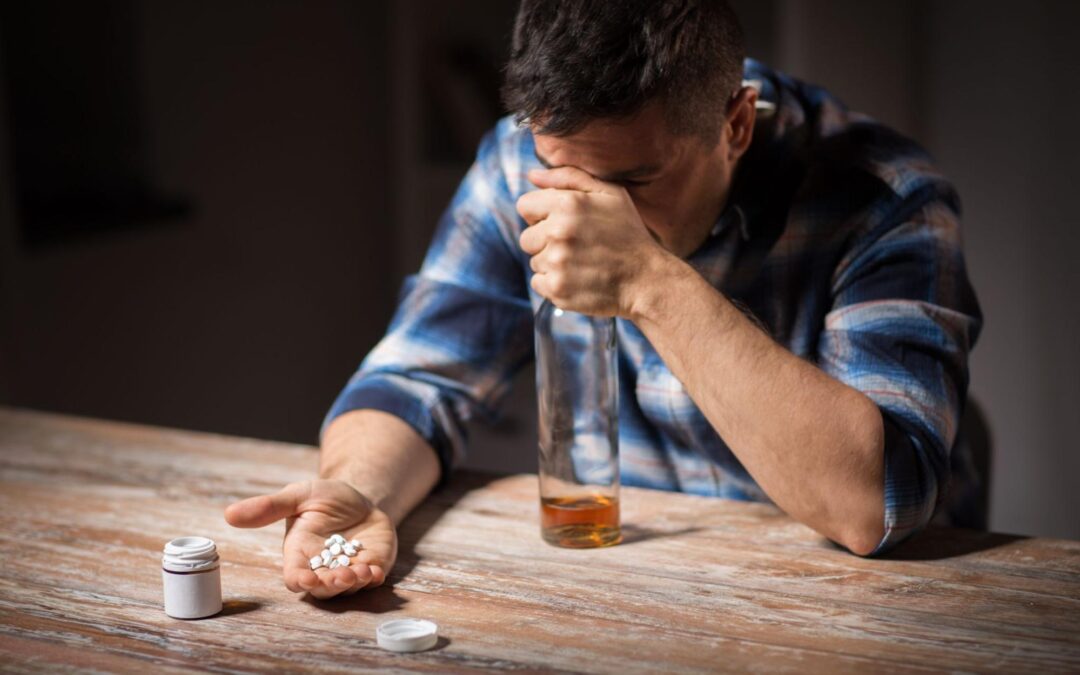Mixing Adderall and alcohol may seem harmless to some, but this combination can set the stage for a dangerous pattern of substance abuse and drug abuse. Adderall, a stimulant prescribed for ADHD, is known for boosting concentration and energy, while alcohol, a depressant, slows down brain function. When taken at the same time, alcohol and Adderall create conflicting effects in the body, leading to unpredictable and risky outcomes.
Understanding The Interaction Between Adderall and Alcohol
Adderall works by stimulating the central nervous system, increasing alertness and focus. On the other hand, drinking alcohol depresses the nervous system, impairing coordination, judgment, and inhibitions.
When these substances are mixed, their opposing effects can mask how intoxicated a person feels, causing them to drink more alcohol without realizing how impaired they are. This can lead to dangerous consequences, including an increased risk of alcohol overdose.
This dangerous combination can also increase the risk of dehydration, heart problems, and other physical complications. More importantly, it sets a precedent for developing a harmful relationship with both substances. When individuals drink alcohol while taking Adderall, the conflicting effects can strain the body, increasing health risks. According to disease control guidelines, combining Adderall and alcohol in this way can lead to severe long-term damage.
How Adderall Can Lead To Alcohol Abuse
Individuals using Adderall often feel heightened energy, productivity, and focus, which can create a temptation to drink more when socializing, studying, or working long hours. Because Adderall can mask the sedative effects of alcohol, people might consume more alcohol than they would otherwise, increasing the chances of overconsumption, blackouts, or even alcohol poisoning.
Over time, this pattern of behavior can lead to both physical and psychological dependence on these substances. Many individuals may start relying on prescription drugs like Adderall to manage work or academic pressures and turn to alcohol to relax or unwind—creating a destructive cycle that’s hard to break. This misuse of Adderall, combined with alcohol, significantly increases the risks of long-term health complications and substance abuse.
The Psychological Dangers Of Mixing Stimulants & Depressants
The combination of Adderall and alcohol doesn’t just pose physical risks; it also impacts mental health. Both alcohol and Adderall are often used in ways that exacerbate dependence—alcohol as a coping mechanism to alleviate stress or anxiety, and Adderall may be abused to enhance performance or boost confidence. This can lead to addiction, where individuals feel they need both substances to function normally or to navigate different aspects of their lives.
This mental and emotional reliance on drugs fuels substance abuse and addiction, making it difficult to stop without professional intervention. Moreover, the false sense of control over one’s body while under the influence can result in dangerous decisions, such as driving, aggressive behavior, or risky sexual activity.
Recognizing The Signs Of Substance Abuse
Signs of a growing problem with Adderall and alcohol include:
- Consuming more alcohol or Adderall than intended
- Needing more of either substance to achieve the same effects (tolerance)
- Using Adderall to counteract alcohol’s sedative effects or vice versa
- Feeling unable to function without one or both substances
- Experiencing withdrawal symptoms, such as anxiety, irritability, or fatigue, when not using them
If these signs sound familiar, it’s crucial to seek help before the combination spirals into a more severe addiction.
Ready to take the next step? If you or someone you know is struggling with substance misuse, reach out for help today. Contact us at CenterPointe Recovery to learn about your options and start the journey toward recovery.

Treatment Options For Those Struggling With Adderall and Alcohol Abuse
Addressing Adderall and alcohol misuse requires a comprehensive approach that targets both the physical and psychological components of addiction. Here are a few effective treatment options:
Detoxification
Detox is often the first step in treatment, allowing the body to rid itself of alcohol use and other substances in a safe, medically supervised environment. This helps manage withdrawal symptoms and prevents complications.
Cognitive-Behavioral Therapy (CBT)
CBT can help individuals recognize the triggers that lead them to misuse Adderall and alcohol and develop healthier coping strategies. This therapy focuses on changing thought patterns that contribute to substance abuse.
Dual Diagnosis Treatment
For individuals struggling with both substance use disorder and mental health disorders like anxiety or depression, dual diagnosis treatment addresses both issues simultaneously. It improves outcomes and reduces the likelihood of adverse effects and relapse.
Support Groups
Support groups such as Alcoholics Anonymous (AA) or Narcotics Anonymous (NA) provide a community of individuals going through similar challenges. These groups offer emotional support and a structured recovery process, which can complement substance abuse treatment and help manage alcohol withdrawal symptoms.
Holistic Therapies
Techniques such as craniosacral therapy, mindfulness, yoga, and acupuncture can complement traditional therapies, helping individuals manage stress and reduce cravings naturally. These holistic approaches can be particularly beneficial for those dealing with the effects of Adderall and alcohol or excessive alcohol consumption.
Intensive Outpatient Treatment Programs
At CenterPointe Recovery we offer a comprehensive intensive outpatient program (IOP) that provides structured treatment while allowing individuals to maintain their daily responsibilities. Our IOP meets three days a week for three hours per day, with morning or evening options available. The program combines decades of experience with individualized care, keeping groups small (8-10 patients) for personalized attention.
Preventing Relapse & Building a Healthier Future
The journey to recovery from Adderall use and alcohol misuse is ongoing, and relapse prevention is a critical component of long-term success. Building a strong support network, maintaining a structured routine, and engaging in ongoing therapy can help individuals stay sober from the two substances and live healthier, substance-free lives.
Don’t wait—get support now. Join one of our outpatient programs in Sarasota, Venice, or Port Charlotte to connect with others facing similar challenges. Visit us to find local support groups and treatment facilities tailored to your needs.
FAQs
What is the relationship between Adderall and attention deficit hyperactivity disorder?
Adderall is a commonly prescribed medication for managing ADHD symptoms. While it can help improve focus and attention, mixing Adderall and alcohol can have extremely dangerous effects.
How do stimulant medications affect mental health?
While stimulant medications like Adderall can benefit individuals with ADHD, using them in combination with alcohol can lead to negative consequences for mental health. The interaction can exacerbate anxiety and other mental health conditions.
What does the Mental Health Services Administration say about substance use?
The Substance Abuse and Mental Health Services Administration emphasizes the importance of recognizing substance use disorders and the need for effective treatment. Mixing Adderall and alcohol can complicate recovery efforts.
Are there guidelines from the Drug Enforcement Administration regarding prescription medications?
The Drug Enforcement Administration provides guidelines for the safe use of prescription medications. Misusing medications like Adderall by mixing them with alcohol is considered a form of drug use that can lead to addiction.
What is the Treatment Improvement Protocol for substance use disorders?
The Treatment Improvement Protocol outlines effective strategies for treating individuals with substance use disorders. This includes addressing the risks associated with mixing substances like Adderall and alcohol.
What are the signs of ADHD, and how can they be managed?
ADHD symptoms include difficulty concentrating, impulsiveness, and hyperactivity. Managing these symptoms typically involves ADHD medication and therapy, but mixing these medications with alcohol can lead to severe complications.
Should I seek professional medical advice if I am mixing Adderall and alcohol?
Absolutely. It’s crucial to consult with healthcare professionals about the risks associated with mixing substances and to explore safer alternatives for managing ADHD and related issues. Combining Adderall and alcohol can lead to severe adverse effects and potentially dangerous interactions.
If you or someone you know is struggling with Adderall and alcohol abuse, seeking professional help is essential. At CenterPointe Recovery we offer comprehensive treatment options tailored to your unique needs. With a combination of group therapy, individual counseling, and holistic approaches our team can help you overcome addiction and build a foundation for lasting recovery.

